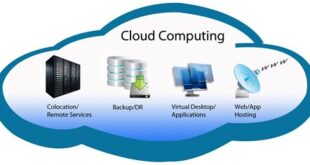
Introduction
Cloud-based software is a groundbreaking technological advancement that has completely transformed the way users access and utilize software applications. Gone are the days when individuals, businesses, or organizations had to rely solely on their own hardware or local servers to run software. With the advent of cloud-based software, users can now access and use applications through the internet, making it much more convenient and efficient.
One such cloud-based software that has gained immense popularity is XYZ software. This software has revolutionized the way businesses operate, allowing them to streamline their processes and enhance their productivity. With XYZ software, businesses can access a wide range of applications and tools that cater to their specific needs, all through the power of the cloud.
XYZ software offers a myriad of benefits, including flexibility, scalability, and cost-effectiveness. By utilizing cloud-based software, businesses no longer need to invest heavily in expensive hardware or constantly maintain and upgrade their local servers. Instead, they can simply subscribe to XYZ software and access the applications they require from any device with an internet connection.
The convenience of cloud-based software goes beyond accessibility. With XYZ software, users can enjoy automatic updates and enhancements, ensuring they always have access to the latest features and improvements. This eliminates the need for manual updates and saves valuable time and effort.
Furthermore, XYZ software enhances collaboration within organizations. With the cloud-based nature of the software, team members can easily work together on projects, regardless of their physical location. This boosts teamwork, fosters creativity, and increases overall efficiency.
Another significant advantage of XYZ software is its scalability. Businesses can easily scale their software usage up or down, depending on their needs. This flexibility allows them to adapt to changing circumstances without incurring unnecessary costs or disruptions to their operations.
Additionally, XYZ software provides robust security measures to protect sensitive data and information. With data encryption, regular backups, and advanced security protocols, businesses can be confident that their valuable data is safe and secure in the cloud.
XYZ software has become an indispensable tool for businesses across various industries. Whether it’s project management, customer relationship management, or data analysis, XYZ software offers a plethora of applications that cater to different needs and requirements.
In conclusion, cloud-based software, such as XYZ software, has revolutionized the way individuals and businesses access and utilize software applications. By harnessing the power of the cloud, users can enjoy seamless accessibility, flexibility, scalability, security, and collaboration. XYZ software has emerged as a game-changer, empowering businesses to optimize their operations and achieve greater productivity. Embracing cloud-based software is no longer a luxury but a necessity in today’s fast-paced digital landscape.
Cloud infrastructure refers to the hardware and software components that are needed to support cloud computing services.
Scalability
When it comes to managing business operations effectively and efficiently, cloud-based software has proven to be a game-changer. One such powerful and versatile cloud-based software is ABC Software, which has gained immense popularity among businesses looking for seamless scalability. With ABC Software, businesses can easily adapt to changing needs and ensure a smooth user experience.
But what exactly is scalability? In simple terms, scalability refers to the ability of a system or software to handle increasing demands and workload without compromising its performance. Scalability allows businesses to scale up or down their resources and services based on demand. This flexibility is particularly crucial for businesses that experience fluctuating workloads or anticipate future growth.
One of the key advantages of cloud-based software, such as ABC Software, is its inherent scalability. Unlike traditional software, which often requires significant infrastructure investments to accommodate growth, cloud-based software allows businesses to scale their operations effortlessly. Whether it’s adding new users, increasing storage capacity, or expanding functionality, ABC Software offers a wide range of options to cater to the evolving needs of businesses.
With ABC Software’s scalability, businesses can easily handle sudden spikes in demand without experiencing any downtime or performance issues. For example, imagine a retail business that experiences a surge in online orders during the holiday season. With traditional software, keeping up with the increased workload can be a daunting task, often resulting in delays or system crashes. However, with ABC Software’s scalability features, businesses can quickly and seamlessly allocate additional resources to handle the increased demand, ensuring a smooth user experience for customers.
Additionally, scalability plays a crucial role in cost optimization for businesses. With cloud-based software like ABC Software, businesses only pay for the resources they need at any given time. This eliminates the need for large upfront investments in infrastructure that may remain underutilized during periods of low demand. Instead, businesses can scale their resources up or down based on actual demand, effectively reducing operational costs and maximizing efficiency.
Furthermore, ABC Software’s scalability empowers businesses to quickly adapt to changing market needs and seize new opportunities. In today’s fast-paced business environment, being agile is essential for staying ahead of the competition. With the ability to scale up or down resources and services effortlessly, businesses can respond to market demands promptly. Whether it’s launching new products or expanding into new markets, ABC Software provides the flexibility needed to support these initiatives without any technical limitations.
In conclusion, scalability is a crucial aspect of cloud-based software, and ABC Software excels in this area. Its ability to adapt to changing business needs, flexibility in scaling resources, and seamless user experience make it a top choice for businesses seeking efficient and powerful software solutions. By leveraging ABC Software’s scalability, businesses can achieve optimal performance, cost optimization, and agility in their operations, ultimately driving growth and success.
Cloud computing is a technology that allows users to access and store data and applications over the internet.
Integration and Compatibility
Cloud-based software, like the powerful and user-friendly XYZ software, provides seamless integration capabilities that significantly impact business operations. By facilitating the connection between different applications and systems, businesses can consolidate their processes, leading to improved efficiencies and enhanced productivity.
One of the key advantages of cloud-based software is its ability to integrate with existing systems and applications. This means that businesses do not need to entirely replace their current software solutions. Instead, they can integrate cloud-based software seamlessly, allowing for a smooth transition and minimizing disruption to daily operations.
For example, let’s imagine a company that already uses an email marketing tool, a customer relationship management (CRM) system, and a project management tool to manage their business processes. With cloud-based software, such as XYZ software, these different systems can be easily integrated, enabling data sharing and synchronization between them.
This integration capability allows the business to have a centralized view of their data and operations, eliminating the need for manual data entry or the hassle of switching between multiple systems. This streamlining of processes not only saves time but also reduces the risk of errors and inconsistencies that may arise from manual data transfers.
Moreover, cloud-based software often comes with pre-built integrations with popular business tools and platforms, further enhancing its compatibility. These pre-built integrations eliminate the need for businesses to invest additional resources in developing custom integrations or figuring out complex technical requirements.
The flexibility offered by cloud-based software also extends to its compatibility with different devices and operating systems. Whether a business operates on Windows, iOS, or Android, or whether employees prefer to work from their desktop computers, laptops, tablets, or smartphones, cloud-based software allows access from any device with an internet connection. This flexibility ensures that employees can work from anywhere, at any time, without limitations imposed by specific hardware or software requirements.
Going back to the example, with XYZ software, the company’s sales representatives can access customer information, respond to inquiries, and update project statuses while on-the-go using their mobile devices. This mobility and accessibility enable them to work efficiently and provide excellent customer service, even when they are not physically present in the office.
Furthermore, cloud-based software’s compatibility extends beyond internal systems. It enables seamless integration with external services, such as online payment gateways, e-commerce platforms, and third-party APIs. Such integration capabilities empower businesses to expand their offerings and effortlessly connect with other businesses or platforms, driving growth and increasing revenue opportunities.
In conclusion, cloud-based software provides a seamless integration experience, enabling businesses to consolidate their processes and improve efficiencies. Whether through integration with existing systems, compatibility with various devices and operating systems, or integration with external services, cloud-based software, exemplified by XYZ software, offers a robust and flexible solution for businesses looking to streamline their operations and achieve optimal productivity.
Cloud services provide various IT resources such as servers, storage, and databases on-demand via the internet.
Conclusion
After exploring the vast benefits of cloud-based software, it is evident that this innovative technology has revolutionized the way businesses operate. With its scalability, cost-effectiveness, and accessibility, cloud-based software offers a myriad of advantages for organizations in the digital age.
One example of a cloud-based software that has gained significant popularity is [Cloud-Based Software X]. This platform has transformed the way businesses handle their operations by providing a seamless and efficient solution to their software application needs. With [Cloud-Based Software X], organizations can enjoy enhanced productivity, streamlined processes, and improved collaboration among team members.
By adopting cloud-based software, businesses can scale their operations according to their needs. This flexibility allows organizations to allocate resources effectively, preventing unnecessary expenses and avoiding over-provisioning. With traditional on-premise software, businesses often face the challenge of managing their infrastructure and software licenses, which can be costly and time-consuming. However, with cloud-based software, organizations can save on hardware costs and only pay for the resources they actually use.
Moreover, cloud-based software is renowned for its cost-effectiveness. By eliminating the need for physical infrastructure and reducing maintenance costs, businesses can enjoy significant savings. Additionally, cloud-based software often follows a subscription-based model, allowing organizations to pay for the services on a monthly or yearly basis. This predictable pricing structure enables businesses to budget more effectively and avoid unexpected expenses.
Accessibility is another key advantage of cloud-based software. With the ability to access software applications and data from anywhere with an internet connection, organizations can empower their workforce to work remotely and collaborate seamlessly. This accessibility not only boosts productivity but also improves overall job satisfaction and work-life balance for employees.
Furthermore, cloud-based software offers enhanced security measures compared to traditional on-premise solutions. With stringent data encryption protocols, regular software updates, and robust backup mechanisms, businesses can rest assured that their data is protected. In the event of a hardware failure or natural disaster, cloud-based software ensures that data can be easily restored, minimizing downtime and potential loss of crucial information.
In conclusion, the rise of cloud-based software has revolutionized the business landscape, offering organizations scalable, cost-effective, and accessible solutions. This technology empowers businesses in the digital age by streamlining processes, increasing productivity, and fostering collaboration. With its numerous advantages, cloud-based software is undoubtedly a game-changer for businesses seeking to thrive in today’s competitive market.
Cloud solutions are designed to address specific business needs and provide scalable and flexible solutions.
 Cloud Solution All Cloud Information
Cloud Solution All Cloud Information








